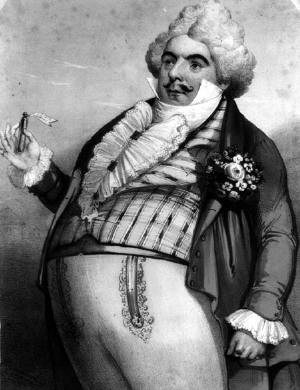

by Gaetano Donizetti
(1797-1848)
Libretto by Giovanni Ruffini, after a libretto by Angelo Anelli

Luigi Lablache, the first Don Pasquale (1843)
| Don Pasquale, an old bachelor | Bass |
| Dr. Malatesta, his friend | Baritone |
| Ernesto, nephew of Don Pasquale | Tenor |
| Norina, a young widow, affianced to Ernesto | Soprano |
| A Notary | Baritone |
Valets, chambermaids, majordomo, dress-makers, hairdresser.
Old Don Pasquale da Corneto is waiting impatiently for Doctor Malatesta, whose help he has obtained in finding a wife so he can disinherit his nephew, Ernesto. Malatesta arrives and tells him of the beautiful, pure young girl he has found for Pasquale – Malatesta’s own sister. Pasquale is delighted; Malatesta goes off promising to bring her to meet him the next day. Pasquale cannot contain his joy, and fantasizes about the half-dozen children he’ll have with her (“Ah! un foco insolito”).
Don Pasquale then confronts his nephew, reminding Ernesto that he, Pasquale, had advised Ernesto to marry a certain wealthy lady, and that, if Ernesto refused, he would be disinherited, and Pasquale himself would marry. Ernesto acknowledges this, but refuses to comply, for he is in love with Norina – whom Pasquale considers unworthy. This simply makes Ernesto more determined in his refusal. Pasquale orders him to find another place to live, for he is getting married. Ernesto is astounded and dismayed, for he has been counting on Pasquale’s fortune to enable him to marry Norina. Now, rather than bring her poverty and misery, he’d give her up. In a last-ditch effort, he asks Pasquale to consult Dr. Malatesta, but Pasquale tells him that Malatesta heartily approves of the match, for the bride is Malatesta’s sister. Ernesto is in despair.
Norina is reading, with much amusement, a romance novel. She herself knows all the tricks and traps of love (“So anch’io la virtù magica”). A letter from Ernesto arrives just as Malatesta comes in chortling over his plot against Don Pasquale. But Norina is not amused, for Ernesto has written a sorrowful farewell to her. Malatesta promises to let Ernesto in on the secret: Norina, pretending to be Malatesta’s sister, will marry Don Pasquale – under a false contract prepared by Malatesta’s cousin, who will play the part of the notary – and drive him so crazy that he’ll be desperate to get rid of her, and she’ll be able to extract from him whatever she wants. Norina agrees on condition that she not lose Ernesto. Malatesta assures her that Ernesto will benefit from the plan as well. He instructs her to play the part of a simple-minded, shy girl. The two are thrilled with the plan, especially Norina, who wants revenge for Pasquale’s refusal to let Ernesto marry her.
Ernesto is disconsolate, for he is now without a home, without his love, and without his friend, Malatesta, who he believes has betrayed him. He has no choice but to go into exile abroad (“Cercherò lontana terra”).
Don Pasquale eagerly awaits the arrival of his bride, and orders the servants not to let in anyone but her and Malatesta. Malatesta soon leads in the shy, trembling girl – Norina, heavily veiled and “in character” – and Pasquale is transported. She pretends to be too frightened even to be in the room with him, and her bashfulness excites Pasquale greatly. Pasquale tries to get to know her, but he wants that veil lifted. Reluctantly, “Sofronia” obeys, sending Pasquale into such paroxysms of joy that he cannot even get the strength to ask her to marry him. Malatesta does so for him, and “Sofronia” – seeing what an idiot Pasquale is – shyly agrees. Pasquale wants to get to a notary right away, but the well-prepared Malatesta has already brought one. Malatesta dictates to the “notary” the contract, which of course contains a clause by which Pasquale leaves half his property to “Sofronia.” Pasquale eagerly signs it, and “Sofronia” is about to do so when a clamor outside makes her drop the pen. Ernesto is fighting with the servants, who are preventing his entry. Norina and Malatesta are horrified, for Malatesta has not yet let Ernesto in on the plot, and they fear that when he sees Norina he will give it all away.
Ernesto bursts in, angry that the servants were treating him like a criminal when all he wanted to do was say goodbye to his uncle. Pasquale, however, is pleased, for he needed a witness to the marriage anyway, and he introduces his bride to Ernesto. Ernesto is shocked to see that the “bride” is his own Norina. Malatesta draws Ernesto aside and assures him that all this is being done for him. Malatesta then hurries the “ceremony” along by having Ernesto sign as a witness, and the notary pronounces the couple husband and wife. But when Pasquale tries to embrace “Sofronia,” she repels him and advises him to wait until he has her permission. Pasquale asks for it, but she refuses. This makes Ernesto laugh, which leads Pasquale to order him to leave. Now the shy “Sofronia” turns into a virago, accusing Pasquale of rudeness and warning that she’ll teach him how to behave. Pasquale is stunned at the change in her, which Malatesta says he cannot explain. “Sofronia” then tells Pasquale that he’s too decrepit and fat to go walking with her, so she needs a young man like Ernesto to squire her about town. When Pasquale refuses to allow it, “Sofronia” puts him straight: she’s the boss now, and she won’t take any back-chat. Pasquale bemoans his fate as Norina and Ernesto laugh at his discomfiture, and Malatesta tries to calm him.
Norina now calls for the servants and, seeing that there are only three, orders the butler – whose wages she doubles – to get more servants. Pasquale is enraged, but she will tolerate no interruptions. She orders the butler to get her two carriages, with horses; new furniture; and a wigmaker, a dressmaker, and a jeweler. When Pasquale asks who’s going to pay for this, she calmly tells him that he is. He refuses, which throws her into a rage, during which she calls him a peasant and other choice names. As Malatesta again tries to calm Pasquale down, Norina and Ernesto declare their love for each other.
Don Pasquale sifts through the mountain of his wife’s bills as the servants run to and fro to prepare Norina to go out. Norina comes out of her room, dressed to go to the theater. She defies Pasquale’s objections. He orders her to her room, but she mocks him and advises him to go to bed. When he bars her way out and calls her a hussy, she slaps him. Pasquale is stunned. Norina is sorry that she hurt him, but it was necessary in order for her love to triumph. Norina then says goodbye, and that she will see him in the morning, but he threatens to bar the doors. Now she sweetly bids him to be good and go to bed, and she will wake him in the morning. But Pasquale thunders that he wants a divorce, for she is the worst wife there is. Norina continues to try to get him to go to bed as he rages on. Finally, she flounces out, dropping a letter as she goes.
Pasquale picks up the letter and finds that it arranges a tryst for that evening between “Sofronia” and an unknown lover, who will signal by serenading her in the garden. Enraged at this latest insult, Pasquale has the servants send for Dr. Malatesta and stalks off. The servants complain among themselves about the confusion in the house, but also find the situation rather amusing.
It was, of course, Malatesta who arranged the tryst and plotted to have Ernesto be the unknown lover. But he is shocked to find Don Pasquale so pale and weak. Pasquale believes himself to be dying, and regrets having fallen out with Ernesto. He tells the doctor of his fight with “Sofronia,” and shows him the letter. Malatesta pretends to be shocked at his sister’s behavior. Pasquale wants to get together some of his men, ambush Sofronia and her lover in the garden, and have them hauled off to prison. But Malatesta assures Pasquale that the two of them could do it alone by simply threatening the couple. This is not enough for Pasquale, but Malatesta reminds him that Sofronia is his sister. Pasquale, recalling the slap, then says that she has got to leave his house, and Malatesta, pondering the problem, comes up with the idea of eavesdropping on the lovers. If she is in fact unfaithful, he says, then Pasquale can simply send her packing. Pasquale loves the idea, but Malatesta knows that it is Pasquale who will be in a trap.
Ernesto serenades Norina (“Com’è gentil”). Norina meets him, and they tenderly declare their love for each other. Meanwhile, Don Pasquale and Dr. Malatesta are slinking through the grove. Pasquale confronts “Sofronia,” who screams for help. Ernesto, meanwhile, has sneaked away. When Pasquale demands to know where her lover is, she denies that anyone was with her. He and Malatesta search the garden unsuccessfully. Pasquale demands that “Sofronia” leave his house, but she insists that the house is hers. Malatesta tells Pasquale to leave everything up to him, and not to interrupt. Malatesta then tells his “sister” that Ernesto’s bride, Norina, is coming to live in the house. “Sofronia” is outraged that such a hussy as Norina will share her house with her, and she would rather leave than be under the same roof with her. But she wants proof that the marriage will really take place. Malatesta tells Pasquale that they must have the marriage performed right then and there before “Sofronia” will leave. Pasquale agrees. Malatesta calls for Ernesto, who speedily arrives and feigns delight that at last his uncle has given in. Pasquale tells Ernesto to get Norina, but Malatesta points out that she is there already, and explains to the stunned old man that he was never really married; it was all a trick. Pasquale calls them all rascals, but he is secretly relieved. When Norina and Ernesto ask his forgiveness, he gives them his blessing. The moral of the story, with which all agree, is that he who marries in old age will find only sorrow.
© 1997 Linda Cantoni